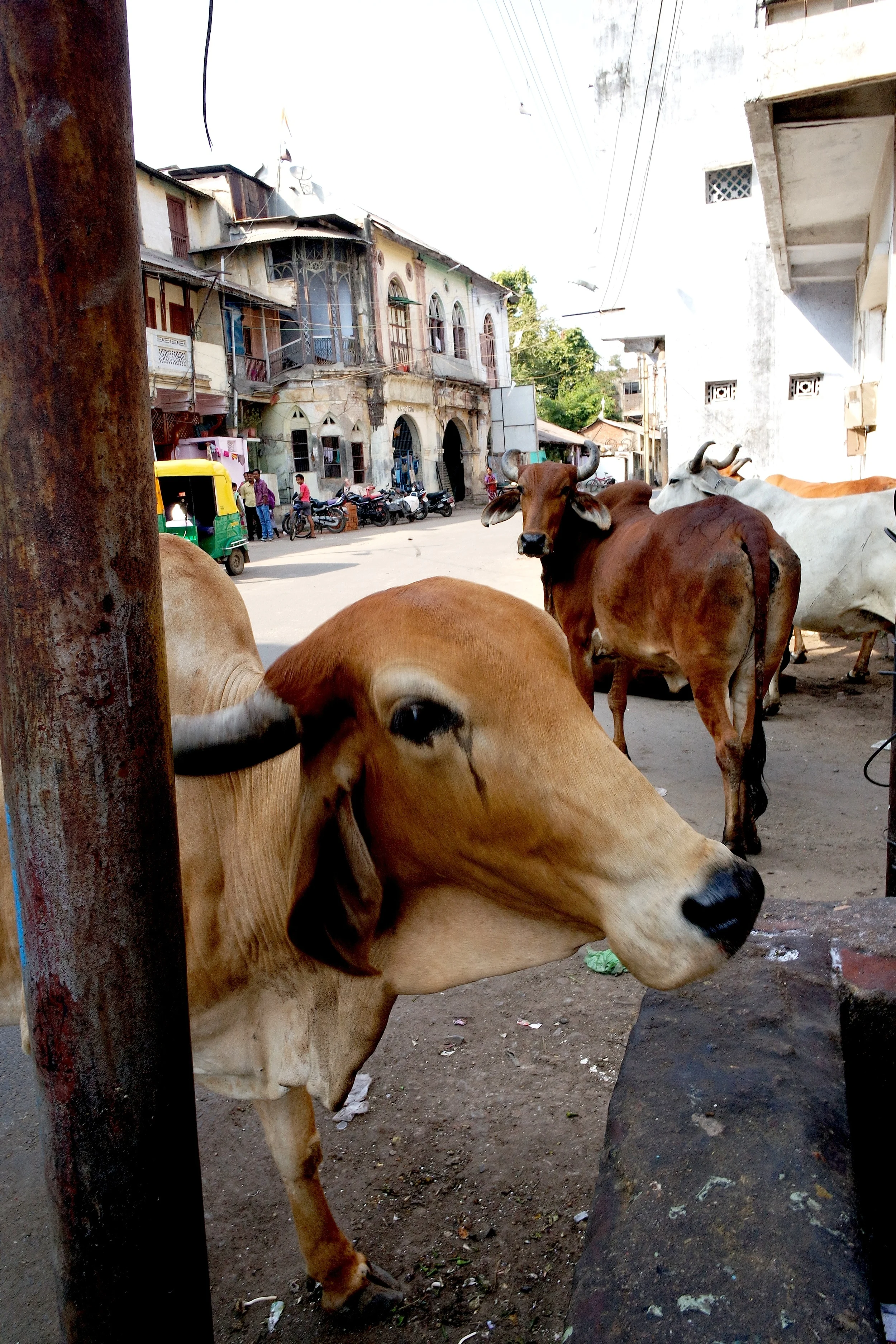Cows like these have free rein in India, where they are revered by Hindus.
Why are cows in India revered as holy? A look at Hindu history reveals why bovines are so blessed there.
Let’s face it. Cows aren’t the most noble of beasts.
If you were to tell me that the world’s 900 million Hindus revered horses above all other creatures, I’d get it. They’re fast, graceful, gorgeous and more than a teensy bit intimidating.
“As cows amble along those dirty, dusty streets, you see them chomping away at the ever-present piles of garbage.
It’s enough to make you think that Indians have a funny way of showing their devotion.”
But their gangly, cud-chewing brethren? I really don’t get it.
Don’t Have a Cow, Man
Historian Mukul Kesavan helps reveal the Indian mindset: “For Hindus, the desi cow is a beautiful thing,” he writes. “Its large eyes, its calm, its matte skin tinted in a muted palette that runs from off-white to grey through beige and brown, its painterly silhouette with its signature hump, make it the most evolved of animals.”
Seeing cows in action in India made me think otherwise. Sure, they have the ultimate right of way on the chaotic, congested roads, causing many a traffic jam. But as they amble along those dirty, dusty streets, you see them chomping away at the ever-present piles of garbage.
It’s enough to make you think that Indians have a funny way of showing their devotion.
Despite this, though, Hindus do take their beliefs seriously. In September 2015, a 50-year-old man in Uttar Pradesh was lynched by a mob. His crime? There were rumors that his family had been storing and eating beef.
Where’s the Beef?
I decided to investigate the root of this bovine reverence.
Turns out Hindus don’t worship cows so much as forbid worshippers from killing them, according to ReligionFacts.
Some of the Rigveda, ancient Sanskrit hymns, refer to the cow as the goddess Devi as well as Aditi, the mother of the gods herself. Cows were also a favorite of Lord Krishna.
“He is said to have appeared 5,000 years ago as a cowherd and is often described as bala-gopala, ‘the child who protects the cows,’” PBS reports. “Another of Krishna’s holy names, Govinda, means ‘one who brings satisfaction to the cows.’ Other scriptures identify the cow as the ‘mother’ of all civilization, its milk nurturing the population.”
Thousands of years ago, Hindus stopped eating beef.
“This was most likely for practical reasons as well as spiritual,” ReligionFacts says. “It was expensive to slaughter an animal for religious rituals or for a guest, and the cow provided an abundance of important products, including milk, browned butter for lamps and fuel from dried dung.”
Panchagavya — a fermented concoction using cow’s milk, curds, ghee butter, urine and dung — is consumed by Hindu worshippers (shudder).
“Most Indians do not share the Western revulsion at cow excrement,” according to ReligionFacts, “but instead consider it an earthy and useful natural product.”
By the early centuries CE, a cow became the appropriate gift to present to a brahman, one of Indian society’s high-caste priests. So revered were cows that killing one was seen as being equal to murdering a brahman.
Gandhi went so far as to say, “If someone were to ask me what the most important outward manifestation of Hinduism was, I would suggest that it was the idea of cow protection.”
Keep It Moo-ving
Not all Indians view the cow so favorably, though.
“What is the greatest traffic hazard in Delhi today? Cows,” writes Bibek Debroy, a columnist for India’s Financial Express, according to PBS. “As our national animal, the tiger may be close to extinction. But the cow is very much around and may soon become our new national animal.”
How to deal with these menaces to society? Debroy offers a tongue-in-cheek solution, PBS continues. “Let them have reflectors and, if not license plates, at least identity cards. Only genuine Delhi cows should be eligible for social security and other benefits.” –Wally





















